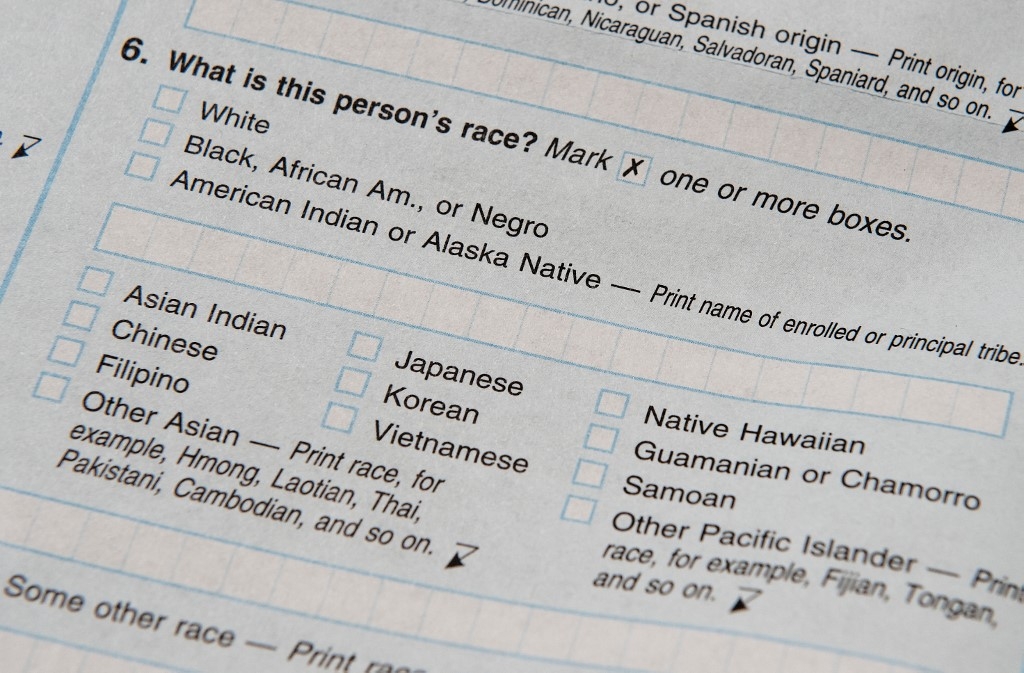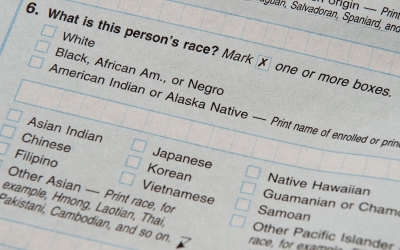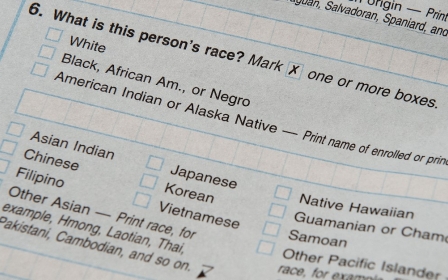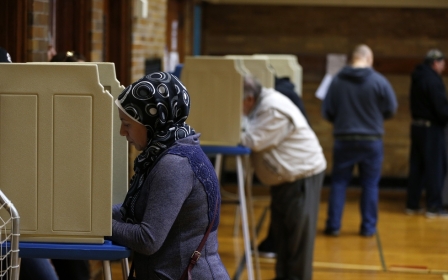White House to review adding MENA category to US Census

Ancestrally from North Africa, Abdul El-Sayed has never referred to himself as white, nor has he ever been treated as such. When he walks down the street, people often think he's Latino. But on the decennial US Census, "white" is the option he is forced to mark under race and ethnicity.
"It is an obliteration of my social experience as an American to call me white. It is not an honest expression of my community," the physician and a former candidate for Michigan's 2018 Democratic gubernatorial primary election told Middle East Eye.
According to the census, the "white" category is for anyone "having origins in any of the original peoples of Europe, the Middle East, or North Africa".
It includes people who "indicate their race as 'white' or report entries such as Irish, German, Italian, Lebanese, Arab, Moroccan, or Caucasian".
But it's a category that most Arabs don’t define themselves as, which is why they are calling for a Middle Eastern or North African (MENA) category to be introduced in the US Census and other federal and health data forms.
New MEE newsletter: Jerusalem Dispatch
Sign up to get the latest insights and analysis on Israel-Palestine, alongside Turkey Unpacked and other MEE newsletters
'This is about correcting a major historic injustice and ending the systemic erasure of an entire community'
- Congresswoman Rashida Tlaib
"Making democratic change is difficult and enforces a lot of the ways we structure racial and ethnic categories in this country," El-Sayed told MEE. "If the last 20 years have meant anything, it’s that we have a real responsibility to these communities to acknowledge them and the challenges and experiences Arabs have faced."
Last week, Congresswomen Rashida Tlaib and Carolyn Maloney sent a letter to the Office of Management and Budget (OMB) and the US Census Bureau urging them to update the standards for the federal data collection on race and ethnicity to include a MENA response category.
The census, which is required every 10 years, maps out the US population and details its demographic features.
In 1997, OMB guidance decided against adding the MENA category and instead reported data collected on individuals from the MENA region within its "white" reference category.
According to a report submitted to the White House Office of Management and Budget, an "agreement could not be reached among public stakeholders on the intended measurement concept (i.e., whether the category should be based on language, geography, etc.) nor on a definition for this category."
As a result, an additional, minimum reporting category for the group was not created.
At the time, the OMB also recommended that "further research should be done to determine the best way to improve data on this population group".
How Arabs came to be associated with 'white'
Last week, one day after Tlaib and Maloney sent their letter, the OMB announced that the Biden administration was beginning a formal review of the government's standards for race and ethnicity statistics - which is expected to be completed by the Summer of 2024 - to help ensure they "better reflect the diversity of the American people".
For Tlaib, this is exactly what she hoped to achieve. "All of our communities in the United States deserve to be seen. This is about correcting a major historic injustice and ending the systemic erasure of an entire community," the congresswoman told MEE.
"This is how we can effectively make policy decisions on prevention, housing, education, public health and more. Middle Eastern and North African communities should not be invisible to their own government.
"We will continue to push and I look forward to marking that box on the 2030 census. MENA residents will finally have their true identity reflected in our nation," she added.
Associating Arab Americans with whiteness is a legal legacy of early American Arab immigrants' struggle for inclusion, Waleed Mahdi, an assistant professor of US-Arab cultural politics at the University of Oklahoma told MEE.
He explained that between the 1900s and 1940s, there were several court cases in which Arab immigrants sought court orders to consider them “white” so they could access many of the privileges associated with whiteness at the time.
For example, in 1915 in Dow v. the United States, when a Syrian immigrant living in South Carolina was denied citizenship because he was deemed racially ineligible. Citizenship at the time was limited to "aliens being free white persons, and to aliens of African nativity, and to persons of African descent".
People were outraged, and eventually, the judge ruled that Syrians "were to be classified as white persons" and were eligible for naturalisation.
But decades later, those from the MENA region started experiencing multiple forms of racism.
"The post-9/11 context has accelerated the realisation that their 'white' label is no more than a label, and they have, in fact, been treated as a people of colour," Mahdi told MEE.
'I am not white'
Mahdi believes adding the term "MENA" as a category will result in benefits, such as quotas granted through affirmative action and inclusion policies. He explained that being able to count the number of people who affiliate with MENA could attract attention during election season as well.
"There is also the symbolic importance of such a move in recognising the presence of such communities, their histories, and their contributions to American society."
In 2010, research from the Census Bureau's Census Race and Hispanic Origin Alternative Questionnaire Experiment found that many people across the focus groups felt that the inclusion of the examples of Egyptian and Lebanese with the white racial category was “wrong” or “inaccurate”.
These comments were often connected to the recommendation that there be a separate racial category for those who would identify as Middle Eastern, North African, or Arab.
In 2015, the Census Bureau tested a MENA category for the 2020 Census, and in 2017 recommended adding the category. But the administration of US President Donald Trump overruled the recommendation.
According to a spokesperson in the US Census Bureau, extensive research has shown that using a dedicated MENA response category in conjunction with a combined race and ethnicity question helps MENA respondents to more accurately report their MENA identities.
But such a decision to add a new category would need to come from a revision to the 1997 Statistical Policy Directive No. 15 by the OMB, which is now being reviewed.
"We are committed to a full, transparent, formal review process for updating OMB's race and ethnicity standard that gives the public and all of the impacted agencies meaningful opportunity to share their perspectives," a Census Bureau spokesperson told MEE.
Layla Abdel, a Palestinian American living in New York, said she's "never been treated as white" and has been waiting "forever" for a MENA category to be added.
"I am not white. If I am truly white, then treat me like I am. How is this country going to tell me I am white but not give me the same privileges they give Germans and Italians?" she asked.
"How are they going to call me white but also call me brown when they talk about 9/11? I have never been treated as white so there is no need for me to continue to have to circle in that option in every form."
Middle East Eye delivers independent and unrivalled coverage and analysis of the Middle East, North Africa and beyond. To learn more about republishing this content and the associated fees, please fill out this form. More about MEE can be found here.






